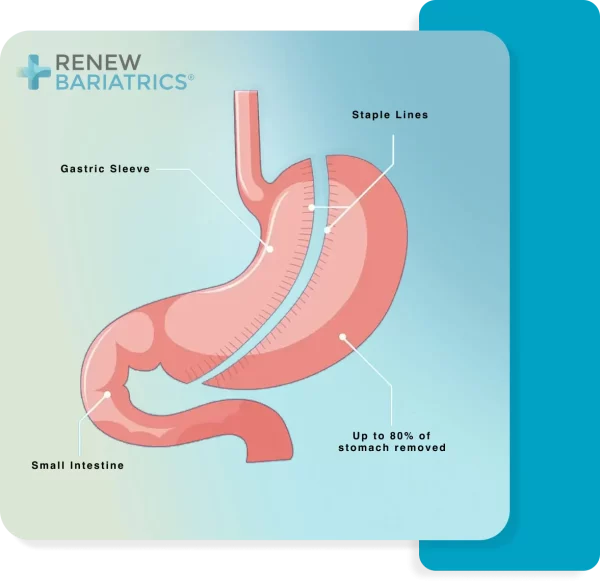Gastric Sleeve Surgery With Renew Bariatrics Offers:
Actual Patient
James
Lost 130 lbs


Autumn
Lost 210 lbs
Felicia
Lost 107 lbs
Robbalee
Lost 270 lbs
At Renew Bariatrics in Tijuana, Mexico, our experienced bariatric surgeons provide sleeve gastrectomy surgery at a fraction of the cost of care in the United States. We are dedicated to helping our patients experience transformative results so that they can look and feel their best.
James
Lost 130 lbs


Autumn
Lost 210 lbs
Felicia
Lost 107 lbs
Robbalee
Lost 270 lbs
Many people choose to have gastric sleeve surgery in Mexico because it’s much more affordable than in the United States. By choosing Renew Bariatrics for your weight loss surgery and traveling a short distance to Tijuana, you can save thousands of dollars and receive top-quality care from experienced bariatric surgeons.
Gastric sleeve surgery in Tijuana at Renew Bariatrics means access to top-tier expertise at a competitive price, offering excellent value. If you are considering traveling to Tijuana to save money, other reasons to schedule with Renew Bariatrics include:
Experienced Surgeons
Our surgeons are double board-certified and have performed over 10,000 surgeries combined. We use modern and advanced techniques to achieve the safest and most successful results.
Affordability
Our package is all-inclusive, and the cost is significantly lower with high-quality services and care, creating outstanding value for patients. We also have convenient ways to pay, starting with a small deposit, including financing credit cards or HSA/FSA funds.
Top Medical Facilities
Each facility is explicitly designed as a state-of-the-art metabolic and bariatric surgical center, with patient safety, comfort, and care as the top priority. Every patient is given their own private room and bathroom for privacy and comfort.
Location
Our office in Tijuana is under 25 miles from the San Diego Airport and minutes from the US-MEX border. For your well being and safety, we are conveniently located in the business district. Our Cancun office is conveniently located on the beach. We are now accepting new patients at both locations.
We do not want financial barriers to prevent patients from achieving life-changing weight loss through safe, effective, advanced gastric sleeve surgery in Tijuana, Mexico. We are dedicated to price transparency, and our services are all-inclusive.
Our all-inclusive package covers everything except your airfare and take-home medications. Your gastric sleeve surgery package includes:
We do not want financial barriers to prevent patients from achieving life-changing weight loss through safe, effective, advanced gastric sleeve surgery in Tijuana, Mexico. We are dedicated to price transparency, and our services are all-inclusive.

Our all-inclusive package starts at just $4,600, covering everything except your airfare and take-home medications. Your gastric sleeve surgery package includes:
Sometimes, diet and exercise are not enough to reach your weight loss goals and achieve a healthy weight. Weight loss surgery with our skilled surgeons can help you reach that goal. However, patients often wonder which bariatric procedure is right for them.
Gastric sleeve surgery, also called vertical sleeve gastrectomy (VSG) or gastric sleeve resection, is a bariatric surgery that surgically removes 75-80% of the stomach, and the intact portion of the stomach is now a small “sleeve” shaped like a banana. The new smaller stomach restricts food intake, helping patients experience sustained weight loss – losing on average 72% of their excess weight by one year after surgery.

Sometimes, diet and exercise are not enough to reach your weight loss goals and achieve a healthy weight. Weight loss surgery in Tijuana with our skilled surgeons can help you reach that goal. However, patients often wonder which bariatric procedure is right for them.
Gastric sleeve surgery, also called vertical sleeve gastrectomy (VSG) or gastric sleeve resection, is a bariatric surgery that surgically removes 75-80% of the stomach, and the intact portion of the stomach is now a small “sleeve” shaped like a banana. The new smaller stomach restricts food intake, helping patients experience sustained weight loss – losing on average 72% of their excess weight by one year after surgery.

Free Quote
If you have tried traditional methods of weight loss and haven’t seen the results you need to live life to the fullest, gastric sleeve surgery in Tijuana, Mexico, can help you reach your weight loss goals to improve your health and your quality of life. With our affordable, all-inclusive packages, vertical sleeve gastrectomy surgery in Mexico is more financially accessible than before.
It’s time to take control of your weight loss journey and your life. Get started and join our countless satisfied patients. Request a consultation by using our online form, or call us toll-free directly today.
Our bariatric surgeons use advanced technology and techniques to perform safe and minimally invasive weight loss surgery in Tijuana, Baja California, Mexico. Laparoscopic surgery carries fewer risks than open surgeries. Laparoscopic bariatric surgery in Mexico also allows for a faster recovery with reduced pain.
You may be a good candidate for gastric sleeve surgery in Mexico if you:
Want to learn more or see if you qualify?
Check your BMI using our simple BMI calculator below.
Use the sliders to calculate your BMI and determine eligibility.
BMI
29
You are overweight
Here from real patients who trusted Renew Bariatrics in Mexico with their weight loss surgeries.
Shae, Real Patient
Amy, Real Patient
Jacky, Real Patient

Yes! We go above and beyond to ensure patient safety. Not only are our bariatric surgeons world-class, but our facility and other support staff are as well. Our ground transportation takes you from the airport or the border, and to our facility. While Tijuana gets a bad rap for safety, the simple fact is it is safe if you do not engage in illegal activity, use common sense, and stick to safe areas, you will be just fine.
Everyone is different and will heal at different rates. It is recommended that you take 2-4 weeks off of work to heal. Most people will heal within 4-6 weeks.
In the first few weeks after surgery, your meals will be very small, about 2-4 tablespoons of food. You can progress to regular food, but you will typically eat drastically smaller portions.

Yes! We go above and beyond to ensure patient safety. Not only are our bariatric surgeons world-class, but our facility and other support staff are as well. Our ground transportation takes you from the airport or the border, and to our facility. While Tijuana gets a bad rap for safety, the simple fact is it is safe if you do not engage in illegal activity, use common sense, and stick to safe areas, you will be just fine.
Everyone is different and will heal at different rates. It is recommended that you take 2-4 weeks off of work to heal. Most people will heal within 4-6 weeks.
In the first few weeks after surgery, your meals will be very small, about 2-4 tablespoons of food. You can progress to regular food, but you will typically eat drastically smaller portions.
My journey with Renew Bariatrics was life changing! Dr. Perez and the staff were top tier and I will remember the genuine care forever. For anyone doubting the surgery, I would tell them to think about living longer, healthier, and lighter. I don’t regret one moment about choosing me and going through the life changing event with Renew Bariatrics.
-Carmeysha
Real Patient Review

Find your estimated weight loss after surgery.
Starting Weight
155 lbs
After 12-18 Months
155 lbs
Estimated Weight Loss
With you're estimated to lose 67 lbs over 12-18 months
You are currently below your ideal body weight and thus not a candidate for surgery.
Ideal Body Weight (IBW) represents the weight a person should be for their height. Excess Body Weight (EBW) is the amount of weight a person is over their IBW.
*The success of a sleeve gastrectomy depends not only on the surgical aspects but also the level of involvement of the patient. The patient's changes in habits are critical for weight loss. Results are not guaranteed.




Copyright © 2024 Renew Bariatrics, Inc. – Proudly based in Mexico with offices in Tijuana and Cancun.
*Individual results may vary, please refer to our disclaimer page. This content is not intended to be a substitute for professional medical advice, diagnosis, or treatment. This site complies with the HONcode standard for trustworthy health information.
Renew Bariatric Doctors authored or reviewed and approved this content.